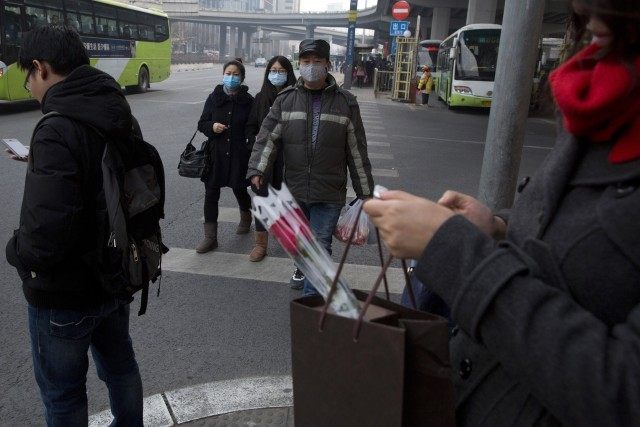Harvard President Drew Faust told her audience at the Tsinghua University in Beijing last week that she wanted to “spend a few minutes talking about the special role universities like ours play in addressing climate change.” Her thesis is unassailable, but of course critics and supporters would strongly disagree about whether that “special role” is a good thing.
Faust spent more than just a few minutes on the subject, as the extensive transcription of her remarks by the Harvard Gazette illustrates. There were a few howlers, such as Faust praising the dangerous “greenhouse gas emission agreement” between Presidents Barack Obama and Xi Jinping – a hollow sham of a “deal” that obliges China to do nothing at all for many years to come.
The Chinese must be laughing themselves sick at the spectacle of their geopolitical adversaries voluntarily kneecapping their economies in service to global warming mythology, while the air in Beijing can be eaten with a spoon on bad days. (Warning: do not eat the atmosphere of Beijing with a spoon – it’s highly toxic.)
All China has to do, in exchange for the fawning adulation of Western academics from the climate cult, is build a few wind turbines and give a couple of speeches. It’s not as if the Chinese ruling class has any institutional resistance to an ideology that presents private skepticism to the commands of government as immoral, on the scale of Holocaust denial. It might be the most efficient form of economic warfare ever devised… and the targets devised it.
As always with climate change speeches, there was plenty of hot air: “The first necessity is partnership. Global problems require global partners. Climate change is a perfect example. We breathe the same air. We drink the same water. We share the planet. We cannot live in a cocoon. The stakes are too high.”
As if the people skeptical of climate-change junk science are “living in a cocoon,” somehow convinced they can retreat to their secret lairs and escape a cataclysm they secretly believe in, no matter what they say, or how many stubborn facts they present! The obvious meaning of such hands-across-the-world patter is to draw international partners into the movement, which is an understandable goal, whether one agrees with the movement or not. But the implied assumption of this Spaceship Earth rhetoric is that the only alternative to the preferred ideology is suicidal selfish folly. That’s not how one conducts an open-minded scientific debate.
Speaking of open-mindedness, the most remarkable passage in Faust’s remarks was her tribute to academic open-mindedness: “Universities must be places where any and every topic can be broached, where any and every question can be asked. Universities must nurture such debate because discovery comes from the intellectual freedom to explore that rests at the heart of how we define our fundamental identity and values.”
That sounds great… but what planet is she describing here? Because it sure as heck isn’t Earth.
The modern academy is a perpetual witch hunt in defense of global warming, feminism, race consciousness, anti-anti-Islam, and numerous other rigid orthodoxies. When the commitment of faculty to these orthodoxies wanes a bit, student mobs pick up the slack by screaming about “trigger warnings” and collapsing into a neurotic heap on the university president’s doorstep. Asking certain questions is tantamount to assault in the modern academic environment.
“Perhaps the most important mission of universities is the education of the world’s young people,” said Faust. “We attract and train the best students. Each year I tell the incoming Harvard College classes that they have ability that is not always measured by high test scores and top grades – that they are chosen not for the magnitude of their achievements but for their capacity to invent, not for what they know but for what they can imagine.”
Educating young people is perhaps the most important mission of universities? What’s potentially more important – indoctrination into fashionable political ideologies? Also, not to be excessively cynical, but one suspects Harvard’s admission policies are a bit more… complex than seeking out students with the greatest capacity for invention and most active imaginations.
That’s not meant as mere nitpicking of common rhetorical flourishes – it’s a core problem with politicized education and science. Ideals and ideological convictions are elevated above mere facts, to the point that narrative-friendly stories will be invented, if they can’t be found roaming free on the range. Ask the University of Virginia and Rolling Stone how that works. The same dynamic is at play with global warming, which was based on theories and computer models that didn’t match up with reality… and reality suffered the worst injuries from the collision.
Faust opened her remarks with a proverb about how “the best time to plant a tree is twenty years ago, and the second-best time is now.” That’s a fine metaphorical reduction of the argument the climate cult has been reduced to making: okay, our predictions have all been wrong for decades, but give us more money and power as insurance against the possibility that we might start being right some day.
As a matter of objective fact, given the life cycle of trees, planting one now is a very poor substitute for planing one 20 years ago, if a tree is truly needed upon a given patch of ground. Granted, that’s a sourpuss observation which ruins a pretty metaphor, but the problem with universities today is a surfeit of lofty aspiration and idealism, purchased at the expense of sourpuss truth. That imbalance is present in everything from the subject matter taught in college, to the financing of tuition, to the political crusades students are being trained to march in.

COMMENTS
Please let us know if you're having issues with commenting.